Why Is The Acolyte So Bad? Here's What Went Wrong

With such harsh criticism, will there be a second season?
Summary
- The Acolyte turned out to be the lowest rated Star Wars show.
- Most of the criticism focused on the writing.
- But compared to other Disney+ projects, some viewers were overly picky.
With all the cancellations and delays that Lucasfilm has had to endure under the Disney umbrella, the studio has still released a fair amount of Star Wars media in recent years. But speaking of live-action shows, many projects, with the exception of Andor and Ahsoka, have been criticized in one way or another by both the press and the fans of A Galaxy Far, Far Away.
And so, from June 4 to July 18, 2024, Disney+ released The Acolyte, which ushered in a whole new SW live-action era set about a century before the events of The Phantom Menace. The series proved to be the most underrated by fans, who aggressively review-bombed it. But why did audiences hate it so much, and was it really that bad?
The Acolyte Has Some of the Worst Reviews in Star Wars Media History
Many have questioned whether The Book of Boba Fett was even necessary, since it offered no substantial plot outside the context of The Mandalorian. The Mandalorian itself, or rather its Season 3, was underwhelming, especially its finale. And Obi-Wan Kenobi, despite the return of Ewan McGregor, Hayden Christensen and even Liam Neeson, just felt too mediocre for many.
None of these shows, however, were as poorly received by audiences as The Acolyte. On Rotten Tomatoes, the audience score is a measly 15%. By comparison, the Boba Fett series received a slightly better score of 45%. The bulk of the criticism came from the script developed by Leslye Headland and her team.

The Acolyte Has Been Criticized for Its Poor Writing
For example, some of the dialogue was found by viewers to be clumsy and half-baked, some characters seemed shallow and even comical, which detracted from the overall tone of the series, and the motivation of some of them was found to be rather weak.
From fan outrage over the way Osha and Mae (both played by Amandla Stenberg) were conceived, to the events of the finale in which Osha and Qimir (Manny Jacinto) simply left Mae at the disposal of the Jedi (it really didn't make much sense), the show had a number of plot holes.
In addition, the writers seemed to lack the desire to provide a thoughtful plot denouement at several points. Time and again, fights ended with one of the parties running away, and time and again, instead of immersing us in the action, we were distracted by flashbacks or simply inconsequential scenes that took away from the already short running time of each of the eight episodes.
But Was It Really That Bad?
While the writing clearly needs improvement, the show doesn't deserve such harsh criticism given its production quality and great acting, and we'd certainly like to see an improved version of The Acolyte by the time Season 2 rolls around.
Many resented the strong blurring of good and evil, as the Jedi were not shown in the best light. But that was always Lucas' point — natural forces, whether light or dark, are beyond authoritarian control, and the Jedi eventually became more of a politicized enforcer than a religious order practicing non-attachment. And no, that doesn't make the Sith any better.
Moreover, while the series didn't offer a groundbreaking original story, it did play off both canon and the Expanded Universe beautifully. The writers clearly did their homework: references to both High Republic events, relatively recent Marvel comics, and even the earliest media like Han Solo's Revenge from 1979 are present. We also got our first look at the live-action Darth Plagueis, how cool is that?